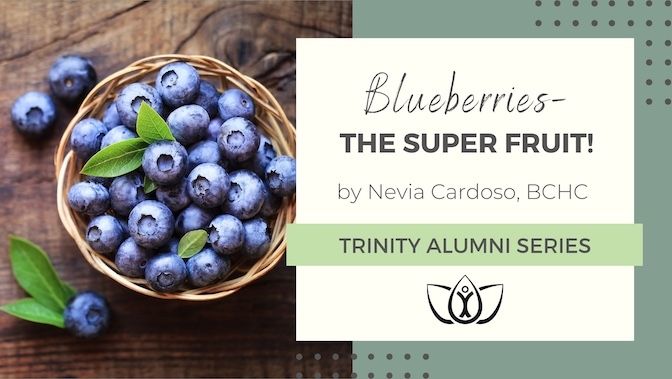 What is so special about blueberries, and how can we incorporate them into our diets? In this blog, we will discuss the importance of these small, blue friends and the easy ways we can add them to our daily fruit intake!
What is so special about blueberries, and how can we incorporate them into our diets? In this blog, we will discuss the importance of these small, blue friends and the easy ways we can add them to our daily fruit intake! But first, a short history lesson!
Did you know that Wild Blueberries are native to North America? They date back more than 13,000 years and were vital to certain Indigenous tribes’ diets. It was discovered that these tribes consumed wild blueberries not only for their flavor but also for their nutritional and healing properties. Blueberries were picked fresh from the bush while they were in season and were often used in stews and other food combinations. In the Winter, blueberry bushes were cultivated by the Indigenous and dried so that they could utilize their benefits in the off-season.
For medicinal purposes, the Indigenous would not only use the berry. They would also take advantage of the entire blueberry bush from roots, stems, flowers, and leaves!
It wasn’t until the early 1900s that Elizabeth White and Frederick Coville successfully cultivated wild blueberries for commercial consumption. Now, they’ve made their way across the Globe! Because of this discovery, blueberries are considered a superfood, and today, over 500 million pounds are distributed around the world.
Today, the most common types of blueberries are from the highbush (mostly used for distribution) and the lowbush, also known as wild blueberries, which are higher in antioxidants than highbush blueberries. I’ve had the pleasure of hand-picking wild blueberries from the Boreal Forest in Chapais, Quebec (Canada), and they are the most delicious blueberries I’ve ever eaten! It’s no wonder they are considered a superfood!
Now that we’ve had the history lesson, what makes blueberries a “superfood”?
Experts say that blueberries are high in anthocyanins, a powerful antioxidant flavonoid that helps keep free radicals at bay. In fact, it’s believed that they have one of the highest numbers of anthocyanins of all fruits and vegetables!
So, what are free radicals? Free radicals are unstable molecules that damage your cells and can cause many diseases and cancers. There are different ways in which free radicals end up inside of us. The most common contributors are external factors like pollution, cigarette smoke (whether you are a smoker or are exposed to it secondhand), alcohol, radiation, medications, and even industrial solvents like those found in pharmaceuticals, cosmetics, agrochemicals, cleaners, degreasers, paints, and inks. When there is a large accumulation of free radicals, your body experiences oxidative stress, which can cause many health issues.
By increasing your daily intake of blueberries to just one cup per day, you are already doing wonders to help fight those free radicals! In this day and age, it’s hard to avoid some of these factors, but fueling your body with the right foods may help break them down.
Blueberries also contain the following important nutrients:
• Vitamin C: the immunity-boosting, collagen vitamin that helps repair wounds
• Vitamin E: beneficial for your skin, blood, and brain
• Vitamin K: for bone health, but also helps to clot blood
• Potassium: supports heart and kidney functions and helps to keep your heartbeat regular
• Magnesium: needed to support healthy sleeping habits, overall mood, and blood circulation
• Folate (Vitamin B9): supports cell growth and function, critical in pregnancy for baby’s development
Blueberries also have high dietary fiber (4g per cup) and score low on the glycemic index (53). Blueberries are also 85% water, making this the fruit you DON’T want to miss out on! Not only are they recommended by experts for people with Type II Diabetes to incorporate into their diets, but research has shown that blueberries may lower cholesterol and blood pressure.
Amazing right?!
Now, what are the ways we can utilize these powerful blue pearls?
The list is seemingly endless!
The following are my favorite ways to eat blueberries. Not only is it easy for super busy parents, but these take little prep time!
• Eat them fresh, right out of the packaging! But make sure to thoroughly rinse your berries before consuming them, as you never know what may be transported with them on their journey to your fridge!
• You can add them to Greek yogurt with strawberries, blackberries, and organic honey. I also add organic granola for that extra crunch factor!
• Add a cup of frozen blueberries in a smoothie with your favorite protein powder, water, bananas, spinach, and organic peanut butter. You can add ice if you want your smoothie thicker, which certainly helps on a hot summer day!
• Inside of pancakes, waffles, or crepes! To add to the flavor, make your own blueberry compote as a topping, or just sprinkle with fresh blueberries!
If you find yourself stumped and need inspiration on how to use blueberries, Pinterest is my favorite resource; so many recipes are listed, which means you will never get bored of blueberries!
Resources:
Leech, J (2023. March 8) 10 Proven Health Benefits of Blueberries 10 Proven Health Benefits of Blueberries (healthline.com)
(n.a.) (2023, September 7) Health Benefits of Blueberries Blueberries: Health Benefits, Nutrients per Serving, Preparation Information, and More (webmd.com)
Wergin, A (2022, July 22) The Power of Blueberries The nutritional power of blueberries - Mayo Clinic Health System
Frothingham, S (2019, January 30) Are Blueberries Good for Diabetes? Diabetes and Blueberries: Weight Loss, Insulin Sensitivity & More (healthline.com)
Prior RL, Cao G, Prior RL, Cao G. Analysis of botanicals and dietary supplements for antioxidant capacity: a review. J AOAC Int. 2000 Jul-Aug;83(4):950-6. PMID: 10995120. Analysis of botanicals and dietary supplements for antioxidant capacity: a review - PubMed (nih.gov)
Wolfe KL, Kang X, He X, Dong M, Zhang Q, Liu RH. Cellular antioxidant activity of common fruits. J Agric Food Chem. 2008 Sep 24;56(18):8418-26. doi: 10.1021/jf801381y. Epub 2008 Aug 30. PMID: 18759450. Cellular antioxidant activity of common fruits - PubMed (nih.gov)
Pham-Huy LA, He H, Pham-Huy C. Free radicals, antioxidants in disease and health. Int J Biomed Sci. 2008 Jun;4(2):89-96. PMID: 23675073; PMCID: PMC3614697.Free Radicals, Antioxidants in Disease and Health - PMC (nih.gov)
Mayo Clinic Staff (2023, August 10) Vitamin E Vitamin E - Mayo Clinic
(n.a.) (no date) Vitamin C (Ascorbic Acid) Vitamin C (Ascorbic acid) Information | Mount Sinai - New York
(n.a.) (no date) Vitamin K Vitamin K Information | Mount Sinai - New York
R Morgan Griffen, A Powell Key (2024, May 8) How Potassium Helps The Body Potassium Supplements: Benefits, Potassium Deficiency, Dosage, and More (webmd.com)
R Ajmera, F Spritzler (2023, December 6) 12 Evidence-Based Health Benefits of Magnesium What Are the Health Benefits of Magnesium? (healthline.com)
Mayo Clinic Staff (2023, August 10) Folate (Folic Acid) Folate (folic acid) - Mayo Clinic
Canadian Wild Blueberries Our Story – Canadian Wild Blueberries
U.S. Blueberries Highbush Council History of Blueberries - Blueberry.org
The Garden Scoop (2019, January 19) The History of blueberries: From Native American Staples to domesticated superfood The history of blueberries: From Native American staple to domesticated superfood | The Garden Scoop | Illinois Extension | UIUC
About the Author
 Nevia Cardoso, BCHC & Wellness Advocate at dōTERRA
Nevia Cardoso, BCHC & Wellness Advocate at dōTERRAMy health and wellness journey started in 2018 when I was introduced to dōTERRA essential oils and natural health products. I wanted to find better, non-toxic ways to support my family’s needs and I have not looked back since! With my passion for natural health products and esthetics, I created a line of bath & body products in October 2020, infused with essential oils and non-toxic ingredients called, by Nevia.
In November 2023, I completed my Health Coach certification at Trinity School of Natural Health and became board certified with the American Association of Drugless Practitioners in January 2024. I am looking forward to expanding my portfolio in the natural health sector soon and becoming a certified Herbologist and Aromatherapist.

This article was reviewed by Lauren Ameling, DC, BCND. Dr. Lauren Ameling is a 2006 graduate of Logan University, where she earned a Doctor of Chiropractic and a Bachelor of Science in Human Biology. She is a chiropractic physician certified in acupuncture and naturopathy, specializing in traditional Chinese medicine, pregnancy and pediatric care, and kinesiology. Dr. Ameling has worked in healthcare education since 2010 and serves as the Chief Operating Officer of Trinity School of Natural Health.


